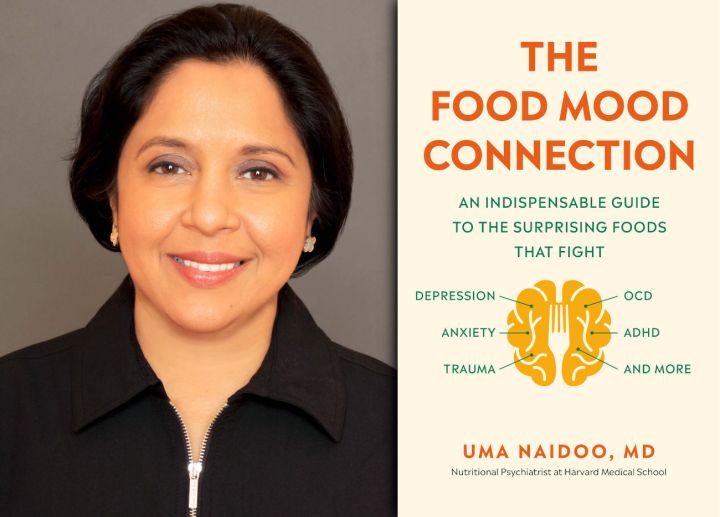BOOK EXCERPT
The Food Mood Connection, by the go-to expert on the impact of food on the brain, Uma Naidoo

Did you know that blueberries can help you cope with the after-effects of trauma? Or that salami can cause depression? From Anxiety to PTSD, Uma Naidoo’s The Food Mood Connection will revolutionise how you approach well-being. Read an excerpt from Chapter 3, “Anxiety: Fermented Foods, Dietary Fibre and the Tryptophan Myth”.
Even if you don’t suffer from an anxiety disorder, you probably intuitively understand that there is a connection between anxious feelings and your gut. Think about how your stomach feels when you are nervous. Maybe you’ve found yourself running to the bathroom before a big test in school. Maybe you’ve felt nauseated or had dry heaves when you’re on edge about a presentation at work. The connection is even built into our language, as we talk about “butterflies in your stomach” for mild nervousness or “a pit in your stomach” for feelings of dread. Those figures of speech aren’t mere coincidence. Whether we realize it or not, they’re inspired by the complex bidirectional relationship between the gut and the brain.
In 2018, Gilliard Lach and his colleagues shed light on the physiological connection between anxiety disorders and bowel issues. Their work centred around gut peptides, short chains of amino acids that are used by your body as signalling molecules, carrying information between the gut and the brain. In the gut, specialized cells called enteroendocrine cells produce more than twenty signalling molecules, including peptides.
The specific types of signalling molecules that are created are determined by your gut bacteria. By manipulating the gut bacteria of mice, and then monitoring the corresponding change in various kinds of peptides present in their guts and brains, Lach and his team were able to track how changes in the gut microbiome influenced symptoms of anxiety, proving that there is a profound connection between the two. Though the researchers weren’t able to make any conclusions about how this knowledge could be applied to microbiome-based therapeutic strategies to combat anxiety in humans, that’s certainly a possibility down the road.
One part of the brain that is especially affected by changes in the gut microbiome is the amygdala, a structure found deep in the brain that is a key part of the circuit that goes awry when you are anxious. In fact, the connection between the microbiome and amygdala development is so strong that some researchers think we should be targeting the microbiome to stabilize amygdala activation and reduce anxiety.
Research has shown that germ-free mice (meaning they lack all microorganisms and therefore have no gut microbiome) have larger amygdalae than mice with normal microbiomes. The amygdala is also hyperactive, working overtime in an unhealthy way. When it comes to amygdalae, bigger and more active is most definitely not better; in humans, a hyperactive amygdala makes it difficult to control your emotions, as if your brain has an alarm that is constantly going off. If the lack of gut bacteria can so profoundly influence the amygdala’s form and function, that’s a strong sign that the microbiome plays an important role in brain health.
In 2004, Nobuyuki Sudo and his colleagues found that germ-free mice also have an exaggerated hypothalamicpituitary-adrenal axis (HPA-axis) response to stress. Incredibly, the introduction of just one specific bacterial species into the mice’s microbiome reversed this. It amazes me that changing just one bacterial species — one among a multitude in the gut — can improve how an organism responds to stress! If you’re doubtful that the brains of mice have much overlap with your stressful human life, rest assured that recent human studies have found similar results. In 2018, a study compared the microbiota in people with generalized anxiety disorder to those of healthy controls. They found that the patients with generalized anxiety disorder had very different bacteria, which were both sparser and less diverse than those in their healthy counterparts. Specifically, bacteria that produce short-chain fatty acids – like the peptides we just discussed, which are a sign of a healthy gut – were scarce, and there was an overgrowth of “bad” bacteria. That’s another clear example of how gut health affects brain health.
An interesting aspect of that study was that simply treating the anxiety disorder through non-dietary methods did not cause a corresponding change in the patients’ gut bacteria. In other words, while the gut has immense influence on the brain’s behaviour, the opposite may not be true – treating mental symptoms with anti-anxiety medication or psychotherapy doesn’t mean that the imbalances in your gut will automatically fall in line. In order to address the root of the problem, you have to target the actual bacteria too.
Finally, irregularities in your microbiome can weaken your gut wall, which usually serves as a barrier preventing bacterial metabolites and molecules from entering the bloodstream. Since a weakened gut wall allows bacteria to leak through the gut lining and into the blood circulation (and even into the brain), this is called leaky gut syndrome. While there are certainly compounds that need to travel into and out of our gut, in general we want to keep the bacteria of our microbiome confined there. When bacteria are allowed to escape, they can cause damage all over the body, including in the brain. For instance, we have evidence that a component of the bacterial cell wall called lipopolysaccharide causes anxiety-like behaviours in mice. DM/ ML
The Food Mood Connection: An Indispensable Guide to the Surprising Foods that Fight Depression, Anxiety, PTSD, OCD, ADHD and More by Uma Naidoo is published by Octopus Books and available from 26 October (R305). Visit The Reading List for South African book news – including excerpts! – daily.















 Become an Insider
Become an Insider
Comments - Please login in order to comment.